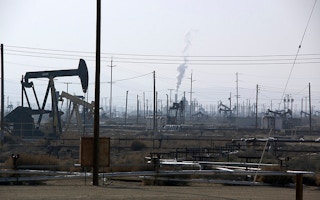The oil industry has been in damage limitation mode ahead of this week’s climate change talks in the Moroccan city of Marrakesh.
On Friday 4 November Shell, BP and other fossil fuel majors launched a collective investment fund aimed at reducing the impact of oil and gas on global warming.
The bulk of the money will be spent on carbon capture and storage (CCS), but the relatively small amount – $1bn over ten years – has been met with derision from environmental critics.
The timing of the latest initiative from the energy companies’ Oil and Gas Climate Initiative (OGCI) is clearly designed to show “we are doing our bit” on global warming.
This section of the energy industry is keen to deflect some of the criticism that will be coming the way of the fossil fuel majors over carbon emissions.
There are 11 leading oil companies involved in the OGCI, including Saudi Aramco and Total who collectively control 20 per cent of the world’s oil resources.
“
No company has more to lose than Exxon. Though widely seen as the best-run oil company in the business, it’s also been the slowest among its peers to face up to the risks that climate change poses to its business.
Bloomberg reporter
Key actors?
These are players who believe that tough new measures to slow CO2 output may be unworkable unless they play a part in the debate.
Some of these companies have already moved back themselves a bit into renewables, but they are mainly pushing CCS-type solutions, plus promoting gas as a “transition” fuel.
Are they serious, or is it just greenwash to try to slow down the whole move to a lower carbon economy and buy time for their legacy oil and gas businesses?
Whatever they are up to, there is another course of action being taken by US energy corporations who have steered clear of the OGCI. Their slogan could be not so much “keep it (carbon) in the ground” as “keep it (your head) in the sand”, according to one critic.
The world’s biggest independently stock-listed oil company, Exxon Mobil, is among the least open to dialogue on climate change.
Chief executive Rex Tillerson and his board in Houston are ferociously independent and are used to financial success.
Critics within
Exxon has no interest in the OGCI and is known to be particularly opposed to that organisation’s calls for a carbon price.
But Exxon is increasingly coming under fire from its own shareholders about an apparent lack of planning for climate change.
Meanwhile two years of low oil prices have left Exxon in a drastically weakened financial state, forced to borrow money to pay dividends.
On 28 October the Texans reported a 38 per cent slump in three-monthly profits – the company’s eighth straight quarterly decline.
Exxon was also forced to admit that it may need to write off almost a fifth of its oil and gas reserves because they cannot be developed at an oil price of $50 per barrel.
The company is under investigation by the Securities and Exchange Commission over whether it is sitting on “stranded assets” that are worth nothing like the value they have been ascribed.
A recent piece on the financial newswire Bloomberg noted the surprising blindness Exxon seems to have around global warming, even when its own survival could be at stake.
“No company has more to lose than Exxon. Though widely seen as the best-run oil company in the business, it’s also been the slowest among its peers to face up to the risks that climate change poses to its business,” Bloomberg said.
Tom Sanzillo, former deputy comptroller (a senior financial official) of New York State and now at the Institute for Energy Economics and Financial Analysis, says Exxon may be in “irreversible decline”, a statement Exxon totally rejects – unsurprisingly.
But whether oil and gas companies are trying to ignore climate change or verbally engage with it, the only measure that really counts is action.
Spending $1bn on CCS over ten years is a drop in the ocean: one carbon capture plant needs more cash than that to install.
There is certainly no sign yet that any of the fossil fuel majors is prepared to follow Danish utility Dong Energy and flick the spending switch even 10 per cent, never mind 100 per cent, from fossil fuels to renewables. Yet even energy experts at Chatham House have warned that Big Oil needs to change its business model or die.
This story was published with permission from Climate News Network.










